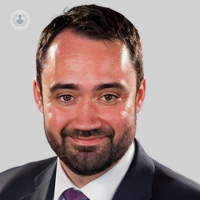Hiatal hernia repair: Understanding the procedure, patient suitability, and success rates
Written by:Hiatal hernia is a medical condition where a portion of the stomach protrudes into the chest cavity through an opening in the diaphragm known as the hiatus. This can lead to discomfort, acid reflux, and other digestive issues. Hiatal hernia repair is a surgical procedure designed to address this condition and provide relief to patients. In this article, revered consultant in upper gastrointestinal and general surgery Mr Tom Wiggins explores the key aspects of hiatal hernia repair, answering important questions for patients preparing for this type of surgery.

Who is suitable for hiatal hernia repair?
Hiatus hernia is a very common condition and repair is generally recommended for individuals who experience persistent symptoms related to their hiatal hernia, such as severe reflux, difficulty swallowing, or chest pain. Candidates for this procedure undergo a thorough evaluation by a specialist, considering factors like the size of the hernia, overall health, and the severity of related symptoms.
Candidates typically share the following characteristics:
- Persistent symptoms: Individuals experiencing chronic symptoms related to their hiatal hernia, such as heartburn or regurgitation, may find relief through surgical intervention.
- Failed non-surgical treatments: When lifestyle changes and medications fail to adequately manage hiatal hernia symptoms, surgical repair may be a viable option.
- Complications: In some cases, hiatal hernias can lead to more serious complications, such as significant difficulty swallowing or respiratory issues. The presence of chronic acid reflux can also predispose to other conditions such as Barrett’s Oesophagus. Surgical intervention becomes advisable in such scenarios.
What does hiatal hernia repair entail?
Preparation
Before surgery patients will undergo a thorough examination, including imaging tests and an endoscopy. Oesophageal physiology testing is often necessary to assess the functioning of the oesophagus and quantify the severity of reflux. This helps the surgical team assess the size and severity of the hernia to guide management options.
Surgery
Hiatal hernia repair is performed using minimally invasive techniques (laparoscopy) under general anaesthetic using around five small incisions. During the procedure, the surgeon will reposition the stomach and close the opening in the diaphragm, reinforcing it to prevent future herniation. This can be performed either with sutures or mesh depending on the size of the hernia. A fundoplication (wrapping of part of the stomach around the lower oesophagus) is also performed to reduce risk of further reflux symptoms.
Recovery
Following surgery, patients typically spend one or two nights in the hospital for monitoring although some may be suitable for day case surgery. Recovery times vary, but most people can return to their normal activities within a few weeks, with dietary restrictions gradually lifted over the course of six weeks.
Postoperative care
Patients receive guidance on postoperative care, including dietary changes and activity restrictions. Regular follow-up appointments ensure a smooth recovery process.
How successful is hiatal hernia repair?
Hiatal hernia repair has a high success rate in alleviating symptoms and preventing complications. The success of the procedure depends on various factors, including the patient's overall health, the size of the hernia, and the surgical technique used.
The vast majority of individuals experience significant relief from symptoms such as heartburn, regurgitation, and difficulty swallowing after hiatal hernia repair. In addition, surgical repair can effectively prevent or address long term risks of hiatus hernias such as strangulation (for larger hernias) or reduce the risk of Barrett’s Oesophagus development due to prolonged acid exposure. Studies indicate that the majority of patients who undergo hiatal hernia repair enjoy a long-term successful outcome, with sustained symptom relief and improved quality of life.
To schedule a consultation with Mr Wiggins, visit his Top Doctors profile today.


